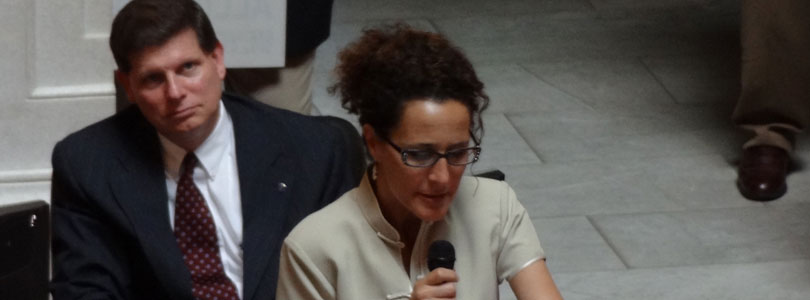05/24/12 – House Floor & Judiciary Committee
4:28 p.m.
The bell is going off for the House floor session. Somehow, I thought the governor’s 5:30 p.m. press conference would siphon away the reporters, but the press bench is full. Of course, there’s still some time. RIPR reporter Ian Donnis is down there (I’m in the gallery), and he told his Twitter followers that he intends to attend the governor’s little event.
4:44 p.m.
Judiciary chair Edith Ajello introduced legislation that would remove good-behavior credits in prison for certain egregious crimes. Rep. Joe Trillo is now speaking, saying that he’s going to support the bill, but reluctantly, because it doesn’t make room for criminals with one-time crimes and it reduces incentive for criminals to behave well.
4:49 p.m.
Rep. Doreen Costa supports the bill but thinks it needs to be “stronger.” She also notes that it will cost $11-16 million.
4:54 p.m.
Ajello “corrected” the ACLU’s cost estimate for the bill, on the grounds that tracking released prisoners costs money, too. She also noted that one-time passion offenses would probably be manslaughter or such (and therefore not affected by the legislation).
Majority Leader Nicholas Mattiello notes that the cost won’t be felt for years to come.
5:01 p.m.
Prevails. Accompanying legislation prevails. One negative in each case.
5:04 p.m.
Another bill that I haven’t followed at all came and prevailed. Another one up, having to do with drugs. Fox opened the board for votes, but Rep. Jeremiah O’Grady stopped him to ask a question about inclusion of synthetic marijuana. Ajello is having difficulty with the chemical names, which she’s reading on the off chance that somebody will know whether one of them is pot; Rep. Larry Valencia has taken over the reading. Much giggling at the inability of anybody to identify what the numbers and chemicals really are.
House Speaker Gordon Fox put a stop to the performance.
5:08 p.m.
Prevails. Now another one from Judiciary having to do with the sale of tools.
5:10 p.m.
Passed. By the way, if I heard correctly, the drug legislation did include synthetic marijuana. (In case you haven’t noticed, I’m trying to do something else and not paying much attention to the backs and forths on these bills.)
5:13 p.m.
With the governor’s press conference fast approaching, the press bench has cleared out, leaving Jim Baron (Pawtucket Times), Phil Marcelo (Projo), and somebody I don’t know.
5:26 p.m.
Lots of summary reading and voting and prevailing. A well-known personage behind me complained to another audience person that all these small bills are bull****, given the state of the state.
5:29 p.m.
Now up, the Woonsocket tax increase. You know, I thought I was being conspiratorial thinking that the governor’s press conference would happen at the exact same time as this discussion, but look at the time stamp.
Finance Chair Helio Melo moves passage.
Rep. Lisa Baldelli-Hunt noted that this tax will carry on to next year, raising the maximum increase. “We at this point have no clear vision or plan to solve Woonsocket’s malaise.”
5:35 p.m.
With tears in her voice and talk about her “political demise,” she made a motion to recommit. Watson and Trillo agree.
5:37 p.m.
Recommitted.
5:52 p.m.
Had a delay as I zipped down to room 35 to get prepared for the hearing.
After Baldelli-Hunt offered her motion to recommit (on grounds of incorrect information), Rep. Rene Menard objected, which would have forced a vote, rather than letting the speaker make the call. After some discussion, Rep. Patrick O’Neil offered a point of order that Menard’s objection should be invalidated, because he had recused himself from the vote.
Fox agreed and made the call to recommit.
6:18 p.m.
Sorry. The Current site was down. Luckily, there was a long wait for a quorum of the committee. We’re two bills in.
6:20 p.m.
The bill for which I’m here, 7859 is second on the agenda, but inasmuch as most of the audience is also here for that, Chairwoman Ajello is zipping through the other items.
6:23 p.m.
Well, hold on. Tiverton Democrat Town Chair Mike Burk is testifying on behalf of the DCYF on one of the bills, having to do with children on probation. ACLU also opposes.
6:29 p.m.
By the way, while this hearing goes on, I should explain that the motion to recommit the Woonsocket bill sends it back to committee, but since it made no provisions for that to happen, it’s unclear what happens. [Next day note: After the I finished liveblogging, a legislator explained to me that the bill goes back to committee without any need for specific provisions.]
On Twitter, I see that Ian Donnis has already spoken with Revenue Director Rosemary Booth Gallogly, and she said she’ll have to consider a budget commission.
6:35 p.m.
Testimony of a family court judge suggests that the problem that the legislation would address (making it mandatory for probation violator to be brought into court) is that probation officers aren’t filing as often as they should.
Rep. Michael Marcello moved to hold for further study (sincerely… given that there are many questions and it really needs further study). Wins.
6:39 p.m.
Now up is a bill by O’Neill. Family Court Chief Judge Haiganush Bedrosian is explaining the bill. It appears to have something to do with the law’s current requirement that potential parents of donor-egg or -sperm children (often same-sex couples) place in papers to request that the unknown donor waive parental rights.
6:48 p.m.
A representative of a legal group for homosexual couples is reluctantly against the bill because they want it to include language making the “intended parents” clearly the actual parents.
6:53 p.m.
Another of the witnesses said that the location of the new language in the law would address those concerns already. Motion passes, with Ajello abstaining.
6:56 p.m.
Now up is the campaign finance bill, being introduced by Christopher Blazejewski. He says the substitute amendment (sub A) exempts 501c3 groups, but he thinks the IRS prevents them from getting involved in elections, anyway.
It also clarifies what publications do not count as “electioneering communications” so as to protect Web sites (like the Current) that are not explicitly political organizations and internal communications of a group contacting its members.
7:01 p.m.
John Marion of Common Cause RI is elaborating on the changes in the legislation. It still would cover ballot-petition elections, though.
The minimum expenditures to trigger the law have been increased to $1,000 and also clarifies that small-dollar donors don’t have to be disclosed just because there aren’t enough big dollar donors in front of them. (Just because 4 rich folks gave tons of money doesn’t mean the person who gave the largest tiny donation will have his or her name published just to answer the requirement of 5.)
7:06 p.m.
Marion says that time windows around elections won’t affect some of the issue advocacy and such that goes on around this time of year. (I’m not sure whether that means municipal financial elections and special elections are effectively exempt.)
7:07 p.m.
Blazejewski talked about favor-buying, which (to me) raises the question of how one can buy influence with a ballot question.
In responding, Marion has said that we haven’t seen the relevant activity in question.
Rep. Peter Martin got up to leave, but Ajello stopped him so that Rep. Richard Morrison could move to hold all unheard bills for further study before losing the quorum.
7:12 p.m.
Kelly Mahoney from the governor’s office testified in favor. Now RI Right to Life Director Barth Bracy is testifying against.
“This bill will not only impact shadow groups,” but will affect groups like his that have long been involved locally. He says, that “remarkably” RI Right to Life is in agreement with the RI ACLU.
7:14 p.m.
Bracy still objects to the provision that requires donors to be named on print, radio, and television. He notes the recent trouble that Occupy Providence caused during a pro-life rally in the State House, suggesting that if we can’t protect people “in the very rotunda of the State House,” how can we protect them in the general public?
He also explained that $1,000 is not a high threshold. As an example, he noted a couple that found out that they couldn’t have a baby and donated wedding gifts totaling $2,500 to the pro-life cause. The legislation would require them to be named in all publications.
He doesn’t like that it applies to referenda, because recent history of issue elections across the country have shown that harassment is a common weapon, especially against traditionalist groups like his.
And he’s, not surprisingly, concerned that errors and violations would open him up to criminal charges.
Rep. Morrison said that the bill is intended to protect smaller organizations like Bracy’s. “That’s what this legislation’s intent is.”
Ajello would not let Bracy reply, because it was a statement, not a question. I don’t know what Bracy was going to say, but he might have meant to point out that intention isn’t the law.
7:23 p.m.
Stephen Brown of the ACLU says that, even though his group does not get involved in elections at all, it would be affected by this legislation.
7:25 p.m.
Brown is saying that recent legislation explicitly created separate law for ballot referendums for the reason that they don’t involve any potential influence buying.
He also says that merely naming a candidate or referendum question creates an electioneering communication.
7:27 p.m.
He says the time spans in the bill conflict with the stated intent. If a donor gives $1,000 in November 2011 and a ballot referendum question appears in June 2012, they’d have to disclose a person who gave money with no concept of buying influence on the issue.
7:30 p.m.
Blazejewski said that the law allows for dedicated bank accounts to raise money and leave other donations out of the loop.
Brown argued that it would severely limit the ability to participate in such referenda, not the least based on time limits. (In other words, organizations like Brown’s collect money regularly to keep on hand in the even that an issue arises. It would be difficult to raise money in a few months to battle objectionable policies on the fly.)
Blazejewski argued with him, stating that he saw an inconsistency in the argument, because the person who gave in 2011 would have known the general causes for which the money would go.
Brown’s response was that there is no inconsistency. In raising general resources, he would have to gather signatures consenting to use of money for purposes (like the June ballot question) that he can’t even foresee.
7:35 p.m.
Now up is a bill to make the Woonsocket memorial explicitly secular, but I’m going to see if I can catch the PUC-cop bill in Senate Judiciary.
7:44 p.m.
Missed it. Boy, this place clears out quickly.




